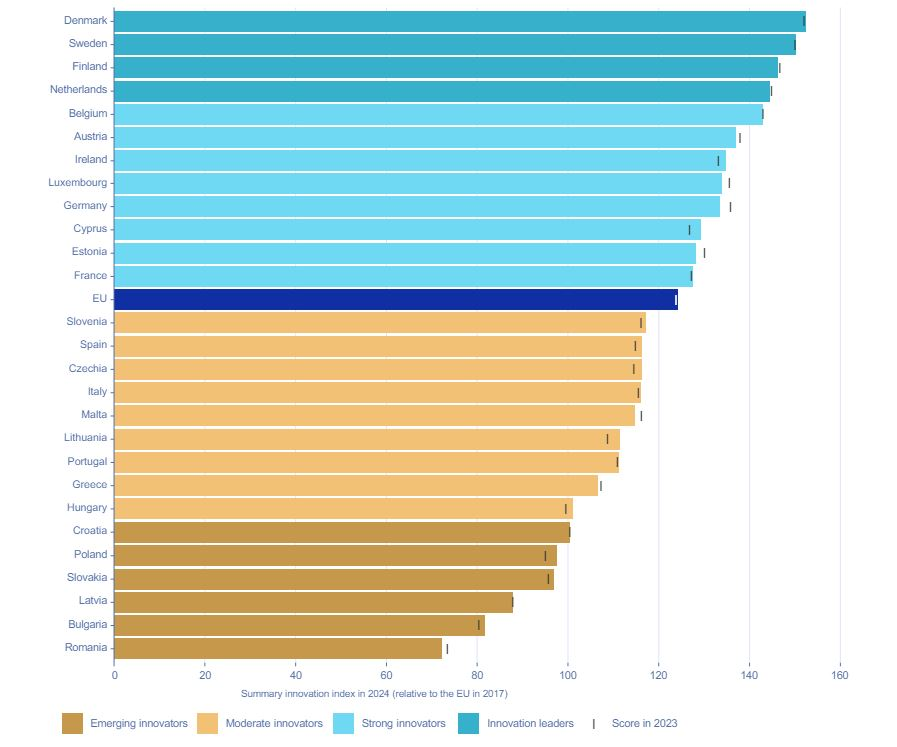Thessaloniki gets ready for its metro launch in November
The underground rapid transit lines have been under construction for almost two decades due to various project delays
 TheMayor.EU logo
TheMayor.EU logo Denmark once again leads the way, but the good news is that more member states are improving their performance in that field
On Monday, the European Commission published its annual European Innovation Scoreboard (EIS), a tool that provides the public with an overall glance over this vital performance factor in the modern world as it applies to EU member states. The leader, just like last year, is Denmark whereas the countries doing relatively poorly when it comes to innovation all form the eastern flank of the bloc.
That being said, the Commission was quick to point out that there is a silver lining and a dash of optimism because overall there has been a continuing increase in innovative performance. Since 2017, that surge accounts to 10%.
However, the surge in innovation spirit is not uniform across the board, which makes it hard to see the EU as a solid innovative region that puts that factor as a priority in order to enhance its competitiveness on the global scale.
The scoreboard showed that 15 member states have improved their innovation performance since last year, one (Croatia) has stalled, and 11 other countries have stepped back in their efforts.
Traditionally, the ranking is divided into four sub-categories: Innovation Leaders, Strong Innovators, Moderate Innovators and Emerging Innovators.

Source: European Commission
Only two countries have changed their category since last year. Estonia became a Strong Innovator following a steady growth pattern since 2017. Belgium, which was an Innovation leader in 2023, moved down to the Strong Innovators category.
What’s notable as a steady pattern is that the innovation landscape in Europe is dominated by Nordic countries. Emerging Innovators which lag behind are once again countries from the easternmost flank of the Union: Poland, Slovakia, Latvia, Bulgaria and Romania.
For more detailed information, you can check out this handy interactive tool, which lets you compare not only countries but also different regions in terms of their competitive edge.
The European Innovation Scoreboard (EIS) is an annual publication by the European Commission that provides a comparative assessment of the innovation performance of EU Member States, neighbouring European countries and for the first time this year - some selected global competitors. The EIS is based on 32 indicators covering the economy, business and entrepreneurship, innovation profiles, governance and policy framework, climate change and demography.
The EIS aims to support policymakers, researchers, and stakeholders in understanding the innovation landscape, finding strengths and weaknesses, and formulating evidence-based policies to enhance innovation across Europe.

The underground rapid transit lines have been under construction for almost two decades due to various project delays

Now you can get your wine in Talence by paying directly in Bitcoin

That’s because the state has to spend money on updating the railway infrastructure rather than subsidizing the cost of the popular pass

Rethinking renewable energy sources for the urban landscape

The examples, compiled by Beyond Fossil Fuels, can inform and inspire communities and entrepreneurs that still feel trepidation at the prospect of energy transition

Now you can get your wine in Talence by paying directly in Bitcoin

The 10th European Conference on Sustainable Cities and Towns (ESCT) sets the stage for stronger cooperation between the EU, national and local level to fast track Europe's transition to climate neutrality.

At least, that’s the promise made by the mayor of Paris, Anne Hidalgo

The underground rapid transit lines have been under construction for almost two decades due to various project delays

At least, that’s the promise made by the mayor of Paris, Anne Hidalgo

Hostal de Pinós is located in the geographical centre of the autonomous region

Despite its church-y name, the district has long been known as the hangout spot for the artsy crowds

Urban dwellers across the EU are having a say in making their surroundings friendlier to people and the environment.

Forests in the EU can help green the European construction industry and bolster a continent-wide push for architectural improvements.

Apply by 10 November and do your part for the transformation of European public spaces

An interview with the Mayor of a Polish city that seeks to reinvent itself

An interview with the newly elected ICLEI President and Mayor of Malmö

A conversation with the Mayor of Lisbon about the spirit and dimensions of innovation present in the Portuguese capital














